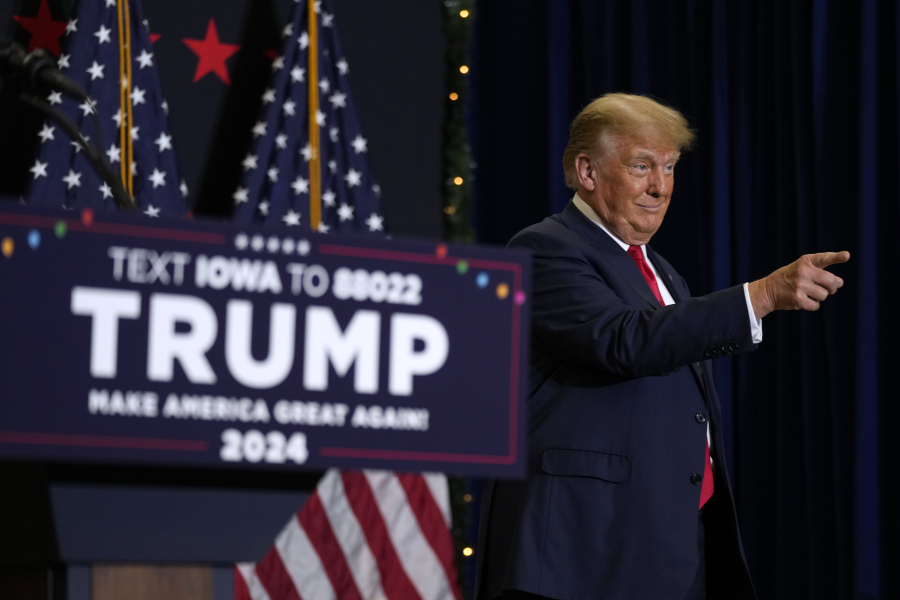A U.S. Supreme Court shaped by Donald Trump is destined to play a pivotal role in determining whether he will land in prison — or return to the White House.
Trump vowed to seek Supreme Court review after Colorado’s top court on Tuesday barred him from the 2024 presidential ballot there, saying his incitement of the Jan. 6 attack on the Capitol disqualifies him from holding office. The 4-3 decision said that under the Constitution’s insurrection clause, he had forfeited his right to run.
And the high court could say this week whether it will take up Special Counsel Jack Smith’s request for fast-track review of the former president’s bid for absolute immunity from criminal charges over his efforts to overturn the 2020 presidential election results.
Together, the cases — and others potentially on the way — promise to give the justices enormous sway over his legal and political fate.
Supreme Court involvement is “all but a certainty,” said Carter Phillips, a Washington lawyer at Sidley Austin who has argued 81 high court cases and signed a brief opposing Trump’s assertion of immunity. “There are just too many issues floating around.”
Already the justices are set to hear an appeal from a Jan. 6 Capitol riot defendant in a case that could undercut part of Smith’s prosecution of Trump.
Supreme Court success isn’t guaranteed for Trump. Although his three appointees – Justices Neil Gorsuch, Brett Kavanaugh and Amy Coney Barrett – shifted the court sharply to the right, that hasn’t translated into victories for Trump in his legal battles.
Trump Rejections
Under Chief Justice John Roberts, the court repeatedly rejected Trump and his allies as they sought to overturn President Joe Biden’s election victory. And in the three years since Trump left office, the court has rejected him four times in document-related battles with prosecutors and lawmakers.
The court dealt with most of those cases without any public dissent, and none of the Trump-appointed justices raised any objections in the cases directly affecting him.
“For the most part, John Roberts has been singularly unsuccessful in his quest to make the court appear to be a nonpartisan institution,” said Michael Dorf, a constitutional law professor at Cornell Law School. “However, the one place where he has had some success is in cases that directly involve Donald Trump.”
The insurrection clause case is likely to reach the high court by the first week of January. Although the Colorado Supreme Court’s ruling would bar him from the state’s primary ballot, the majority put its decision on hold, giving Trump until Jan. 4 to appeal.
The ruling, the first of its kind, invoked a constitutional provision approved after the Civil War to say that Trump’s incitement of the Jan. 6 riot rendered him ineligible to serve as president again.
“This is an extraordinary holding from the Colorado Supreme Court,” said Derek Muller, a law professor at the University of Notre Dame. The Supreme Court “will face intense pressure as it is asked to weigh in on this hot-button political case.”
Trial Date
Smith’s request is geared toward ensuring a trial in Washington can start as scheduled on March 4. He is asking the Supreme Court to immediately consider Trump’s argument, rejected by a federal trial judge, that he enjoys absolute immunity for election-related actions taken while he was president.
Because the trial is on hold until Trump’s appeal on the issue is resolved, Smith says the justices should take the unusual step of bypassing the Washington-based federal appeals court that would normally be next in line. Trump’s response is due by 4 p.m. Wednesday.
Trump’s arguments, if successful, would mean dismissal of the charges against him in Washington and probably also in Georgia state court, said Joyce Vance, a former federal prosecutor who teaches at the University of Alabama School of Law.
“Immunity is really the key issue here,” Vance said. “There are a lot of good reasons for the Supreme Court to resolve all of this very quickly. And the question is whether they see it that way or not.”
If the Supreme Court doesn’t intervene right away, the justices are likely to have another chance early next year. The appeals court has put the case on an expedited track, with arguments planned for Jan. 9 in case the justices don’t take up the matter immediately.
Phillips said it is “absolutely critical to people’s sanity” that the Supreme Court resolve the issue. “A ruling against him would go a long way toward at least quieting some of the foment about all this,” he said.
Still more issues are likely to follow. Trump and his legal team have suggested they will seek Supreme Court review of an appeals court ruling restricting his ability to attack key figures in the election-obstruction case. Trump is facing a similar gag order in New York’s civil fraud trial against him.
Trump is also pressing two other motions to dismiss the Washington indictment. One makes arguments similar to those being pushed at the Supreme Court by Jan. 6 defendant Joseph Fischer, saying prosecutors are misusing a 2002 law that criminalizes at least some forms of obstruction of an official proceeding.
“The court has a raft of Jan. 6 and Trump-related issues to sort through,” said Timothy Zick, a constitutional law professor at William & Mary Law School. “Democracy issues will certainly be front and center at the court this term.”
©2023 Bloomberg L.P. Visit bloomberg.com. Distributed by Tribune Content Agency, LLC.



